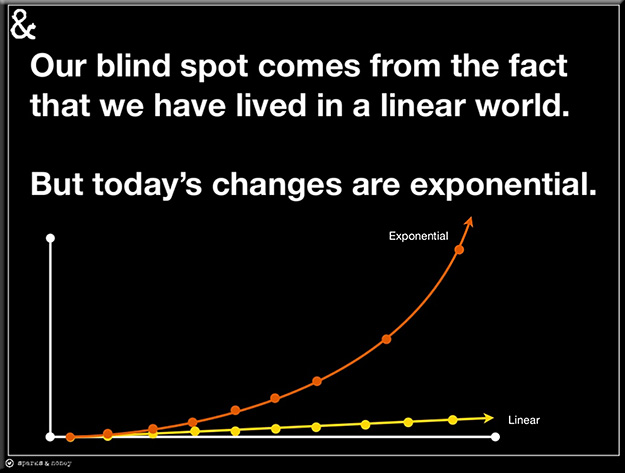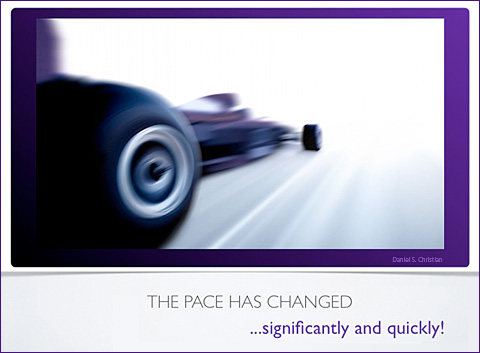Thinking about the future of work to make better decisions about learning today — from er.edcause.edu by Marina Gorbis
By looking at historical patterns and identifying signals of change around us today, we can better prepare for the transformations occurring in both work and learning.
Excerpt:
Instead of debating whether learning is for learning’s sake or as a means for earning a living, we need to think about the forces and signals of transformation and what they mean for higher education today and tomorrow.
So let’s explore these deeper transformations.1 From our experience of doing forecasting work for nearly fifty years, we at the IFTF believe that it is usually not one technology or one trend that drives transformative shifts. Rather, a cluster of interrelated technologies, often acting in concert with demographic and cultural changes, is responsible for dramatic changes and disruptions. Technologies coevolve with society and cultural norms—or as Marshall McLuhan is often quoted as having said: “We shape our tools and afterwards our tools shape us.” Nowhere does this apply more critically today than in the world of work and labor. Here, I focus on four clusters of technologies that are particularly important in shaping the changes in the world of work and learning: smart machines; coordination economies; immersive collaboration; and the maker mindset.
From DSC:
I appreciate this article — thanks Marina.
Marina’s article — and the work of The Institute for the Future (IFTF) — illustrates how important is it to examine the current and developing future landscapes — trying to ascertain the trends and potential transformations underway. Such a practice is becoming increasingly relevant and important.
Why?
Because we’re now traveling at exponential rates, not linear rates.

We’re zooming down the highway at 180mph — so our gaze needs to be on the horizons — not on the hoods of our cars.

Institutions of higher education, boot camps, badging organizations, etc. need to start offering more courses and streams of content regarding futurism — and teaching people how to look up.
Not only is this type of perspective/practice helpful for organizations, but it’s becoming increasingly key for us as individuals.
You don’t want to be the person who gets tapped on the shoulder and is told, “I’m sorry…but your services won’t be necessary here anymore. Please join me in the conference room down the hall.” You then walk down the hall, and as you approach the conference room, you notice that newly placed cardboard is covering the glass — and no one can see into the conference room anymore. You walk in, they shut the door, give you your last pay check and your “pink slip” (so to speak). Then they give you 5 minutes to gather your belongings. A security escort walks you to the front door.
Game over.
Pulse checking a variety of landscapes can contribute
towards keeping your bread and butter on the table.
Also see:
- Credentials reform: How technology and the changing needs of the workforce will create the higher education system of the future — from er.educause.edu by Jamie Merisotis
The shift in postsecondary credentialing and the needs of the 21st-century workforce will revolutionize higher education. Colleges and universities have vast potential to be positive agents of this change.
.
- New workers, new skills — from er.edcause.edu by Marina Gorbis
What are the most important skills—the work skills and the life skills—that students should acquire from their educational experience, and what is the best way to teach those skills?Excerpt:
We found that the following short list of skills not only continues to be relevant but also is even more important as meta-skills in the changing worlds of work:
- Sense-making: the ability to determine the deeper meaning or significance of what is being expressed
- Social intelligence: the ability to connect to others in a deep and direct way and to sense and stimulate reactions and desired interactions
- Novel and adaptive thinking: a proficiency in coming up with solutions and responses beyond those that are rote or rule-based
- Cross-cultural competency: the ability to operate in different cultural settings, not just geographical but also those that require an adaptability to changing circumstances and an ability to sense and respond to new contexts
- Computational thinking: the ability to translate vast amounts of data into abstract concepts and to understand data-based reasoning
- Media literacy: the ability to critically assess and develop content that uses new media forms and to leverage these media forms for persuasive communication
- Transdisciplinarity: a literacy in, and the ability to understand, concepts across multiple disciplines
- Design mindset: the ability to represent and develop tasks and work processes for desired outcomes
- Cognitive load management: the ability to discern and filter data for importance and to understand how to maximize cognitive functioning using a variety of tools and techniques
- Virtual collaboration: the ability to work productively, drive engagement, and demonstrate presence as a member of a virtual team
While we believe that these ten skills continue to be important, two additional skills have emerged from our ethnographic interviews for these new worker categories: networking IQ and hustle.
- Train your brain to think about the future — from knowledgeworks.org by Katie King
Thinking about the future is like taking a jog: we can always find something to do instead, but we will be better off later if we take time to do it.








